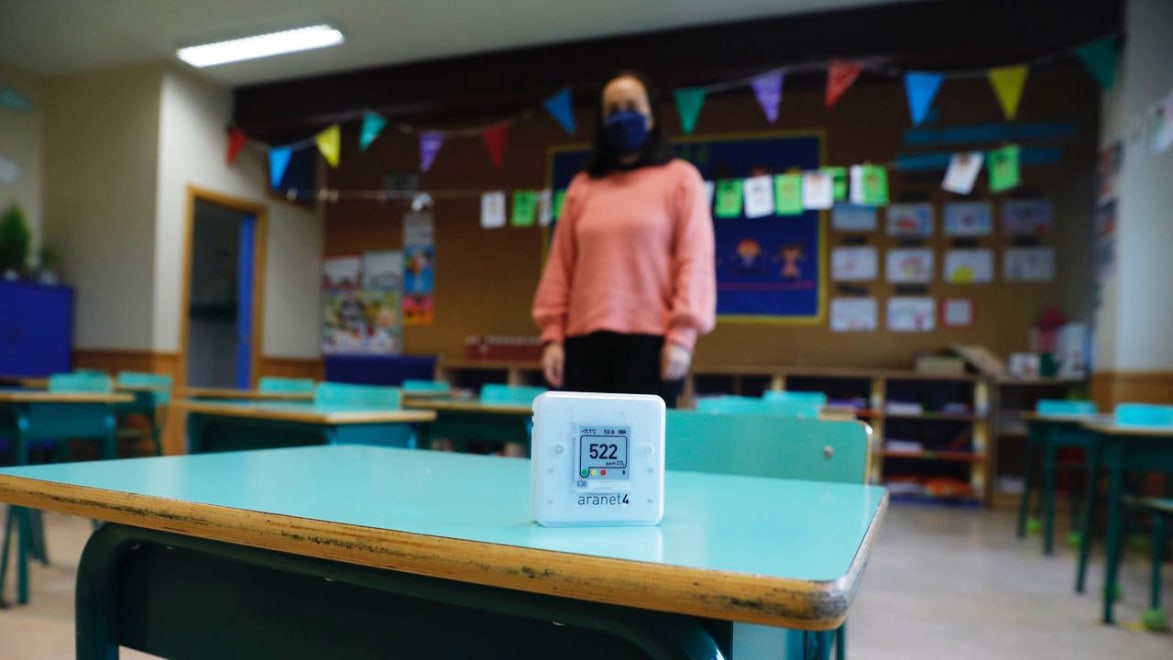A CO2 Traffic Light Indicator for the COVID-19 in Classrooms: the Pioneering System of a Galician School
AMPA in A Coruña invests 7200 euros in air quality monitors: “We will pass the cold season as it is just and necessary”
Once it was demonstrated that the new coronavirus is also transmitted by aerosols (particles suspended in the air), the parents of the Jesuitinas school in A Coruña were clear about where the budget saved in 2020 would go due to the cancellation of school activities for the new 2021 budget. Most of the savings went to the purchase of 36 indoor air quality monitors.
“At AMPA we got in touch with scientists specialized in environmental pollution from the CSIC, from the University of Castilla-La Mancha and with researchers such as the Aragonese professor at the University of Colorado José Luis Jiménez. Since August we have been wondering how we could help the school to increase security measures against COVID-19 transmission”, says Ana González Neira, the vice president of AMPA. Having discarded the air purifiers that were banned by the Xunta, the parents asked the experts for advice on the meters that monitor air quality from levels of CO2 concentration in a room.
“The CO2 monitors are like a traffic light that informs about how saturated the environment is. They indicate the degree of cleanliness. The more concentrated, the greater the risk of contagion of COVID-19 by aerosols. The classrooms measure 60 square meters and in each one we have 25 students. When CO2 levels are above 700 ppm (parts per million), the yellow light comes on and then teachers know that they have to open the windows to let the fresh air in. As it is about children, we do not wait for it to reach the red level, in the 1200 concentration of carbon dioxide,” explains Emma Quiroga, the director of the center where some 900 kindergarten and primary school children study.
With this new monitoring system, which was installed during the Christmas holidays, it also ensures that the little ones do not get colder than necessary in the classroom. “The other option is to stay all day with the windows open. With the CO2 monitors it is known in real-time how loaded the environment is, something that can help us after the pandemic since a higher concentration of CO2 is associated with lower levels of concentration,” argues Emma Quiroga. “It’s like when there is smoke in a room. The best way to end this contamination is to ventilate the room,” says Ana González.
The Aranet4 HOME monitors, manufactured in Europe, have been procured by AMPA. Each one costs about 200 euros and they have placed one in each classroom, 36 in total, so the final budget was 7200 euros. “Before investing in other activities, safety was the most important thing for us. It is not that we are rich, quite the opposite,” remarks González, vice president of the association of mothers and fathers.

Photo: lavozdegalicia.es Aranet4 measures the CO₂ level in Las Jesuitinas MARCOS MÍGUEZ
MEASURE “PRESSURE” They tell from AMPA that its objective is also to raise awareness in all Administrations. “These CO2 monitors should be in every school in Galicia and also in public institutions. Before taking drastic measures such as closing the entire hotel industry, it could be verified which premises maintain good air quality to reduce the probability of contagion by aerosols,” González defends.
Appliances complement them with one application that has developed the USC with Meteogalicia: ventilacion.usc.es. “With the monitor you can see how fresh the air is inside, the application gives an orientation to older people in the outside environment, with guidelines on how and when to ventilate depending on the wind forecast”, clarifies Emma Quiroga, who has an impact: “We receive children from all neighbourhoods, for teachers it provides peace of mind, they avoid the anguish of ventilating too little or not enough. With a visual “green traffic light indicator” they know the fresh air flow is good. Galicia is not Burgos, but with this method we also can guarantee optimal thermal comfort”. With the arrival of January and the storm Filomena in the Peninsula, “we will pass the cold just and necessary,” concludes the director of the Jesuitinas.
The text above is translated, the original article available in THIS LINK.